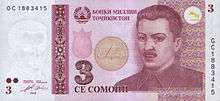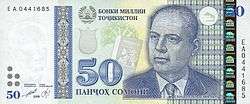Tajikistani somoni
| Tajikistani somoni | |
|---|---|
| Сомонӣ (Tajik) | |
|
5 somoni obverse and reverse. | |
| ISO 4217 | |
| Code | TJS |
| Denominations | |
| Subunit | |
| 1/100 | diram |
| Plural | somoni |
| diram | diram |
| Banknotes | 1, 5, 20, 50 diram, 1, 3, 5, 10, 20, 50, 100, 200, 500 somoni |
| Coins | 1, 2, 5, 10, 20, 25, 50 diram, 1, 3, 5 somoni |
| Demographics | |
| User(s) |
|
| Issuance | |
| Central bank | National Bank of Tajikistan |
| Website |
www |
| Valuation | |
| Inflation | 6% |
| Source | The World Factbook, 2012 est. |
The somoni (Tajik: cомонӣ, ISO 4217 code: TJS) is the currency of Tajikistan. It is subdivided into 100 diram (Tajik: дирам). The currency is named after the father of the Tajik nation, Ismail Samani (also spelled Ismoil Somoni).
History
The somoni was introduced on 30 October 2000;[1] it replaced the Tajikistani ruble, at the rate of 1 somoni = 1000 rubles.[2]
The currency is divided into 100 diram for one somoni. Diram banknotes were first introduced on 30 October 2000 to start the currency off and coins were introduced later in 2001 with the intention of creating a more efficient monetary system and gradually replacing the diram notes. This was also the first time circulating coins were introduced in Tajikistan.
Coins
Circulation coins, first issued in 2001 were struck in denominations of 5, 10, 20, 25, 50 diram composed of brass clad steel and 1, 3, and 5 somoni in nickel clad steel. Bimetallic 3 and 5 somoni coins were first released in 2003. The reverse of all somoni coins are changed annually and commemorate various events. A second issue dated 2011 was issued in June 2012, and included 5, 10, 20, 50 dirams and 1 somoni.[3]
Tajikistan coins are struck by Goznak at the Saint Petersburg Mint in Russia.
| The First Series | ||||||||||
|---|---|---|---|---|---|---|---|---|---|---|
| Image | Value | Technical parameters | Description | Date of minting | ||||||
| Reverse | Obverse | Diameter | Thickness | Mass | Composition | Edge | Obverse | Reverse | ||
| |
5 diram | 16.5 mm | 1.35 mm | 2 g | brass-clad steel | Plain | Tajik 7-star crown, "ҷумҳурии Тоҷикистон"1, year of minting | Value | 2001 | |
| |
10 diram | 17.5 mm | 1.4 mm | 2.4 g | ||||||
| |
20 diram | 18.5 mm | 1.4 mm | 2.7 g | ||||||
| |
25 diram | 19 mm | 1.4 mm | 2.76 g | Brass | |||||
 |
50 diram | 21 mm | 1.45 mm | 3.6 g | ||||||
 |
1 somoni | 24 mm | 1.6 mm | 5.2 g | See remark 2 | Reeded and plain sections | Ismail Samani, "ҷумҳурии Тоҷикистон", value, | Value and the Tajik 7-star crown, year of minting | 2001 | |
 |
3 somoni | 25.5 mm | 1.8 mm | 6.3 g | Lettered | Coat of arms, "ҷумҳурии Тоҷикистон", value | ||||
 |
5 somoni | 26.5 mm | 1.85 mm | 7 g | Reeded and plain sections with a star | Abuabdullo Rudaki, "ҷумҳурии Тоҷикистон", value, "Рӯдакӣ"3 | ||||
| These images are to scale at 2.5 pixels per millimetre. For table standards, see the coin specification table. | ||||||||||
Remarks
- "ҷумҳурии Тоҷикистон" = "Republic of Tajikistan"
- Standard Catalog of World Coins: 1901–present, 31st ed. states that the composition for 1, 3, and 5 som is cupronickel-zinc, while the Central Bank states cupronickel.
- "Рӯдакӣ" = "Rudaki"
Remarks
- "ҷумҳурии Тоҷикистон" = "Republic of Tajikistan"
Banknotes
| The Current Series | |||||||||
|---|---|---|---|---|---|---|---|---|---|
| Image | Value | Dimensions | Main Colour | Description | Date of | ||||
| Obverse | Reverse | Obverse | Reverse | Watermark | printing | issue | |||
 |
 |
1 diram | 100 × 60 mm | Brown | Sadriddin Ayni Theatre and Opera House | Pamir Mountains | Two mountains over rectangle | 1999 | 2000 |
 |
 |
5 diram | Blue | Arbob Cultural Palace | Shrine of Mirzo Tursunzoda | ||||
 |
 |
20 diram | Green | Meetings Hall of the National Bank of Tajikistan | Mountain road | ||||
 |
 |
50 diram | Purple | Ismail Samani | Mountain valley | ||||
 |
 |
1 somoni | 141 × 65 mm | Green | Mirzo Tursunzoda | National Bank of Tajikistan | Portrait | ||
 |
 |
3 somoni | 141 x 65 mm | Violet | Shirinsho Shotemur | Majlisi Oli | 2010 | 2010 | |
-donatedsb_f.jpg) |
-donatedsb_b.jpg) |
5 somoni | 144 × 65 mm | Blue | Sadriddin Ayni | Shrine of Abuabdullo Rudaki | 1999 | 2000 2010 2013 | |
-donatedsb_f.jpg) |
-donatedsb_b.jpg) |
10 somoni | 147 × 65 mm | Red | Mir Said Alii Hamadoni | Tomb of Mir Said Alii Hamadoni | |||
-donatedsb_f.jpg) |
-donatedsb_b.jpg) |
20 somoni | 150 × 65 mm | Yellow-brown | Abuali ibn Sino | Hissar Castle | |||
 |
 |
50 somoni | 153 × 65 mm | Blue | Bobojon Gafurov | Chaikhana (teahouse) Sino | |||
-donatedeh_f.jpg) |
-donatedeh_b.jpg) |
100 somoni | 156 × 65 mm | Brown | Ismail Samani | Presidential Palace | |||
 |
 |
200 somoni | 159 x 68 mm | Brown and Yellow | Nusratullo Makhsum | National Library building in Dushanbe | 2010 | 2010 | |
 |
 |
500 somoni | 162 x 71 mm | Purple and Gray | Abuabdullo Rudaki | Palace of Nations in Dushanbe | |||
| For table standards, see the banknote specification table. | |||||||||
| Current TJS exchange rates | |
|---|---|
| From Google Finance: | AUD CAD CHF EUR GBP HKD JPY USD RUB |
| From Yahoo! Finance: | AUD CAD CHF EUR GBP HKD JPY USD RUB |
| From XE: | AUD CAD CHF EUR GBP HKD JPY USD RUB |
| From OANDA: | AUD CAD CHF EUR GBP HKD JPY USD RUB |
| From fxtop.com: | AUD CAD CHF EUR GBP HKD JPY USD RUB |
Note: These rates could be substantially different from the rates the central bank publishes
Somoni is the second-highest-valued currency unit in Central Asia ( behind Turkmenistan manat ).
See also
References
Notes
- ↑ National Bank of Tajikistan. "Banknotes and coins". Archived from the original on 2007-04-29. Retrieved 2007-05-19.
- ↑ Linzmayer, Owen (2012). "Tajikistan". The Banknote Book. San Francisco, CA: www.BanknoteNews.com.
- ↑ http://worldcoinnews.blogspot.com.au/search/label/tajikistan
Sources
- Krause, Chester L.; Clifford Mishler (2003). 2004 Standard Catalog of World Coins: 1901–Present. Colin R. Bruce II (senior editor) (31st ed.). Krause Publications. ISBN 0873495934.
- Cuhaj, George S. (editor) (2005). Standard Catalog of World Paper Money: Modern Issues 1961-Date (11th ed.). Krause Publications. ISBN 0-89689-160-7.
External links
| Preceded by: Tajikistani ruble Reason: inflation Ratio: 1 somoni = 1000 rubles |
Currency of Tajikistan 2000 – |
Succeeded by: Current |